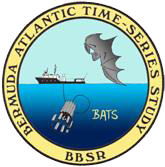 ©2026 Biological and Chemical Oceanography Data Management Office.
©2026 Biological and Chemical Oceanography Data Management Office.Funded by the U.S. National Science Foundation
A full description of the BATS research program (including links to the processed BATS data) is available from the BATS Web site (see above for Project URL/ Project Website links). Any data contributed from selected ancillary projects are listed (linked) in the 'Datasets Collection' section below.
Collaborative Research: The Bermuda Atlantic Time-series Study: Sustained Biogeochemical, Ecosystem and Ocean Change Observations and Linkages in the North Atlantic (Years 36-40)
Awards OCE-2241455, OCE-2241456 and OCE-2241457)
NSF award abstract
Long-term observations of ocean physics, biology, and chemistry across decades provide a powerful lens for understanding the response of the oceans to environmental change. This award will continue the Bermuda Atlantic Time-series Study (BATS) research program, which began in 1988, for another five years. Observations at the BATS site provide crucial information for understanding the ocean?s role in the global climate system and the response of the ocean carbon system and marine ecosystems to climate perturbations. The research goals of the BATS program continue to be to improve our understanding of the time-varying components of the ocean carbon cycle and related elements of interest (such as nitrogen, phosphorus, and silica) and to identify the physical, chemical, and ecosystem properties responsible for this variability. The BATS program has substantial broader impacts, contributing to the field of ocean sciences by providing high-quality ocean observations and a framework in which other researchers can conceive and test hypotheses. In addition, the recent acquisition of the Bermuda Institute of Ocean Sciences by the Global Futures Laboratory of Arizona State University provides new avenues for educational opportunities and innovation.
In the subtropical gyre of the North Atlantic Ocean, warming, salinification, deoxygenation, ocean ecosystem changes, and acidification have accelerated their rate of change. Fundamental questions and challenges remain about understanding present and future ocean function, prediction, and modelling. An overarching question for the BATS program is: Will ocean biogeochemistry and ecosystem functioning continue to change in response to the acceleration of ocean warming, salinification, stratification, deoxygenation and acidification? With this question in mind, the sustained goals for the BATS program are: 1. Quantify the role of ocean-atmosphere coupling and climate variability on air-sea exchange of carbon dioxide (CO2) and carbon export to the ocean interior; 2. Document trends and controls of the following: (a) the interannual to decadal scale variability in carbon and nutrient cycles and their coupling in the surface and deep ocean via the Redfield Ratio paradigm; and, (b) biological community structure in the oligotrophic North Atlantic Ocean in response to low-frequency climate variability; 3. Quantify the response of planktonic and microbial community structure and function and impact on biogeochemical cycles (including new and export productivity) to variability in surface fluxes (e.g., heat, freshwater and momentum) and physical processes (e.g., mesoscale eddies, Rossby Waves, internal waves); 4. Facilitate development, calibration and validation of next-generation oceanographic sensors, tools and technologies; 5. Generate datasets that can be used by empiricists and modelers to test new hypotheses about North Atlantic Ocean biogeochemistry and ecosystem functioning; 6. Use BATS cruise, infrastructure, laboratory and analytical expertise, and data to improve education and training programs for BATS staff, STEM-literate students, and future oceanographers.
This award reflects NSF's statutory mission and has been deemed worthy of support through evaluation using the Foundation's intellectual merit and broader impacts review criteria.
Please see the BATS Web site (http://bats.bios.edu) for additional information.

Principal Investigator: Nicholas R. Bates
Bermuda Institute of Ocean Sciences (BIOS)
Co-Principal Investigator: Rodney J. Johnson
Bermuda Institute of Ocean Sciences (BIOS)
Co-Principal Investigator: Michael W. Lomas
Bermuda Institute of Ocean Sciences (BIOS)
Co-Principal Investigator: Deborah K. Steinberg
Virginia Institute of Marine Science (VIMS)
Contact: Michael W. Lomas
Bermuda Institute of Ocean Sciences (BIOS)
Ocean Carbon and Biogeochemistry [OCB]
U.S. Joint Global Ocean Flux Study [U.S. JGOFS]
Ocean Time-series Sites [Ocean Time-series]